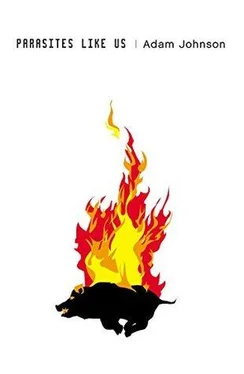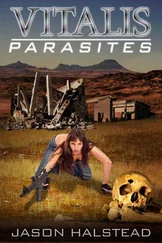I trudged downhill toward the water, my boots leaving long tracks in the snow, but I knew already it must be Eggers. I stopped and looked around to see if other people inhabited this world. I searched for dorm lights turning on, for cars humming over the bridge trestle, even for the contrails of jets crossing the sky, but there was no one.
Out on the dock stood Eggers, half lit by dawn, the clump of his skins on the pier timbers beside him. I thought he might be doing some kind of experiment on exposure. Then he jumped into the water. A spray rose in the air, and a moment later came the muted sound of the splash. I waited for that great whoop of icy pain to follow, but it never arrived. Eggers executed a few strong strokes, swimming in place against the current, and then he grabbed a ladder, letting his body swing round in the pull of the river. I couldn’t make out the bar of soap he was using, but I could clearly see the milk of sudsy water that flowed away from him. Soap was a pretty clear violation of his nontechnology pact, but I understood his urge to scrub down. Killing that pig had made me feel dirty, too. I decided to leave Eggers to his own conscience. A morning of ice fishing with Farley, I hoped, would help me with mine.
The river trail is a path that originally linked USSD and Parkton College to Lewis and Clark Lake, a mile or so upstream, so students could shortcut up to swim and row. Throughout the summer after my mother left, I practically lived along the water’s edge: during the hot days, I’d race down this hill on blocks of ice, sometimes making it to the water, usually careening past couples who lay back in the high grass, shorts turning green as they lazily kissed and slapped mosquitoes from each other’s legs. Afternoons brought bowfishermen who stalked through the cattails along shore for the great carp who wallowed there, and groups of old people who pointed canes at particular birds before they all lifted their field glasses in unison. My mother would be coming home soon, I figured, and until then, I meant to run a little wild.
My mother would be coming home soon, I was told and told, and when that didn’t happen, Janis appeared, and the three of us would stroll down to the water’s edge after supper, Dad swinging a lantern whose mantles hissed the way. Photos from those days show my face fixed in a sour, sullen anticipation. The only thing that would lift my mood was when, in the evening, we bought a brick of fireworks and strolled down this path, waiting for the river to flash with sunset, after which we’d skip rockets off the water’s surface, bouncing Black Cats and Roman candles in knee-hops across the river, and occasionally depth-charging a floral mortar that would, before thumping up a smoky mist, flash yellow-gray below. Those were Janis’ favorites — that faintly glimpsed percussion, before the water shocked white, gave her more satisfaction than any spray of color.
But now, as I walked up the slushy path, everything seemed different. The trail gradually wandered from the river and rose with the levee toward the lake. Gone were elm trees that had lined the walk. Gone were the benches under them. Where was the spring I used to drink from, and the footbridge over it? The whole idea of a path seemed obsolete, meant for families that no longer existed.
Soon, the rush of the spillway was all you could hear, and to keep walkers from slipping into the outfall below, an epoxy-green handrail appeared, though now it was glazed with ice. I had almost climbed to the level of the lake, and there was now a view. From this height, the trail I was on looked more like a primitive highway that connected a hog-processing plant, a prison, and an expanse of concrete that ran the last great North American river through the jackscrews of modernity. The irony was that these were the best spots to fish: the dam churned up all the rich nutrients from the bottom of the lake so that huge walleye and pike lurked just beyond the spillways, and downhill from Club Fed was the spot to cast for smallmouth bass, because the runoff from all the prison’s fancy fertilizers supported thick reed beds along the banks. And then there was Hormel, whose underwater pipes carried animal waste out into the middle of the Missouri. That’s where you caught channel catfish, otherworldly in size, some big and slick as stillborn calves.
But Farley and I were perch fishermen. The perch is a small fish that avoids the light and is only vulnerable in the delirium of winter cold, so you need to go out early, and run your lines deep. The perch weighs in around a pound, so there is no mythic “lunker” out there. In that way, fishing for them is a lot like spending your time flint-knapping Clovis points, the secret craft of which is long forgotten. Because no Clovis chipper has ever cried “Eureka” and no fisherman ever stuffed and mounted a perch, both endeavors foster a certain intimacy with failure. Fishing, anthropology, and indoor gardening seem to exist completely in this space between tedium and futility.
The climb became steeper, the trail more slippery. As I neared the concrete abutments, gusts of mist flashed over the cap-wall and raced down to frost my glasses. I stopped to puff my inhaler, and you could taste the ozone coming off the turbine generators. They used to repeat a story when I was a kid, a tale about a man who fell in the concrete while they were building the dam, and was entombed alive because for some reason they couldn’t stop pouring the cement. It was so-and-so’s father who fell in. No, someone else would say, it was so-and-so’s. I’m pretty sure the story was apocryphal, but when I looked at those deep, gray walls I always pictured that human bubble, caught mid-tumble within.
Looking down upon the town — the snow-plowed streets, a frozen Ferris wheel, the prison on a hill that would become my home — I became nostalgic, for everything, even the Hormel plant, whose furnace bricks would glow white-hot before the year was out. I can fall, as with the wave of a watch, this easily into the soupy stupor of reverie. I have come to believe, after a life of research and personal observation, that there are two fallacies to being human, one great paradox, and three crimes. The first crime against existence is hope. After that great savager of life, the second crime is nostalgia, generally a lesser offense. Anthropology will teach you there’s no such thing as the good old days, but hope — hope drives death’s getaway car.
I turned my back on this town and headed for the ice. I skirted the dam’s control room and climbed the cement stairs that led over the floodwall, then negotiated an embankment of stacked boulders — bucket out for balance — that led down to the Lewis and Clark Lake. I’ll tell you this: When the South Dakota wind kicks up, it’ll take your back and, with an elbow around your throat and heels in your kidney, it’ll ride you like a mule. But if that wind blows across miles of frozen lake, driving dry snow and blades of ice, it’ll first make a chump of you — whistling in your armpits, doing laps around your belly, snapping the back of your scrotum — before the real hurt begins: the dry cuts, tongue swell, lip peel, and eye freeze.
I set out across the ice, baby-stepping the slick spots and holding my arm up against sharp flurries of wind-driven snow that tail-chased my vision. Ahead was a village of wooden warming huts staggered along the ice, each strategically placed above what some fisherman believed must be a point of interest for fish on the lake bottom below. When I was young, you’d see men huddled around their holes as if warming themselves around campfires. Now you only saw fancy huts that men had towed out with snowmobiles, each one surrounded by a half-dozen ice holes with tilt-up fishing rigs. Through the wind, I made out my first glimpse of humanity, aside from Eggers, that morning: as I walked through the field of huts, men took turns emerging to scoop newly formed ice out of their holes, and in the flashes when their doors were open, I caught bits of country music and talk radio, saw men slouched toward the blue glow of televisions. One figure stared religiously into the pulsing screen of a fish finder.
Читать дальше












